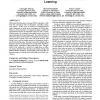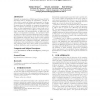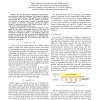179 search results - page 6 / 36 » Automated organization design for multi-agent systems |
INFFUS
2010
13 years 6 months ago
2010
This paper introduces design principles for modular Bayesian fusion systems which can (i) cope with large quantities of heterogeneous information and (ii) can adapt to changing co...
ATC
2009
Springer
14 years 2 months ago
2009
Springer
Abstract. An Organic Computing system has the ability to autonomously (re-)organize and adapt itself. Such a system exhibits so called self-x properties (e.g. self-healing) and is ...
ATAL
2009
Springer
14 years 2 months ago
2009
Springer
Multi-Agent Reinforcement Learning (MARL) algorithms suffer from slow convergence and even divergence, especially in largescale systems. In this work, we develop an organization-b...
ATAL
2007
Springer
14 years 1 months ago
2007
Springer
Research on organization of Multi-Agent Systems (M.A.S.) has shown that by adapting its organization, a M.A.S. is better able to operate in dynamic environments. In this paper we ...
CEC
2007
IEEE
14 years 1 months ago
2007
IEEE
Abstract— The next generation of embedded computing systems will have to meet new challenges. The systems are expected to act mainly autonomously, to dynamically adapt to changin...



